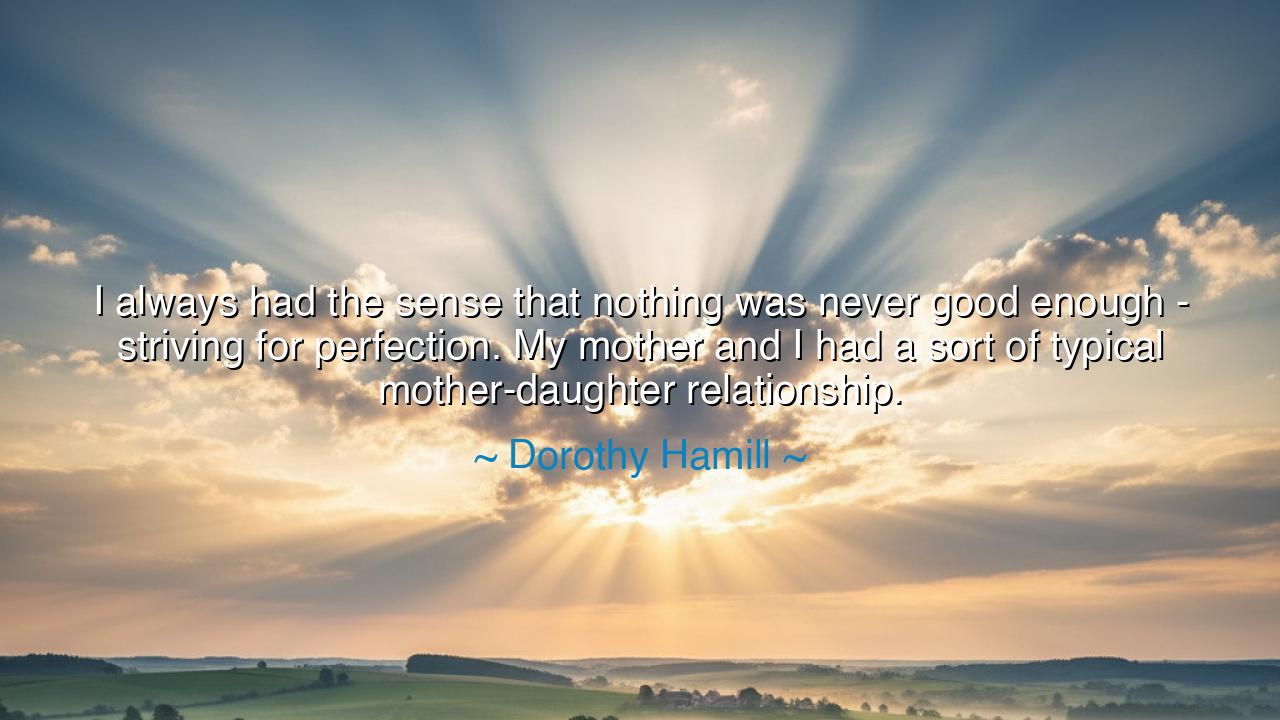
I always had the sense that nothing was never good enough -
I always had the sense that nothing was never good enough - striving for perfection. My mother and I had a sort of typical mother-daughter relationship.






In the voice of reflection, “I always had the sense that nothing was never good enough – striving for perfection. My mother and I had a sort of typical mother-daughter relationship.” Thus spoke Dorothy Hamill, the skater of grace and discipline, whose path was shaped not only by her own will but by the expectations borne within her home. Her words reveal the eternal struggle between the pursuit of perfection and the yearning for acceptance.
The meaning lies first in the confession that “nothing was ever good enough.” This is the burden of the perfectionist, who labors not only to achieve but to exceed endlessly, never resting, never fully content. Such striving may forge greatness, but it also weighs upon the soul, for the hunger for flawlessness can never be sated. Yet from this restless fire, champions are often born.
The mention of the mother-daughter relationship brings depth to the teaching. For between parent and child flows both love and tension: the parent pushes, the child strives, and in that crucible both are shaped. The “typical” bond Hamill describes speaks to generations, where mothers urge their daughters higher, sometimes harshly, out of love, duty, or hope for their flourishing. From such bonds arise both wounds and strength.
The origin of this wisdom is in Hamill’s own life, where discipline, artistry, and pressure wove together to create a skater remembered across time. Her words remind future generations that the pursuit of perfection is double-edged: it can lift one to greatness, but it also calls for gentleness toward oneself and reconciliation with those who shaped the journey. For in the end, no performance, however flawless, can surpass the quiet need for love and understanding.






LAVu Lan Anh
In reading Dorothy Hamill’s thoughts, I can’t help but think about how many people might feel like they can never quite reach their personal goals. Is it because we’re always comparing ourselves to some ideal that’s hard to define? And when it comes to family relationships, particularly with mothers, do those dynamics intensify the feeling of never being enough? This idea seems so relatable, yet heartbreaking.
HGDang thi Hoang Giang
The idea of nothing being good enough resonates with me. Do you think that the pursuit of perfection can sometimes make us feel disconnected from the people closest to us, like our mothers? It’s possible that the expectations set by such relationships can be a double-edged sword, where we strive to please yet never feel fully validated. I wonder if Dorothy’s drive for excellence was more about seeking approval or fulfilling an inner need.
SSannyzan
I find it interesting that Dorothy talks about perfection in such an intimate way. It makes me wonder: is the desire to always improve a form of self-motivation, or does it come from feeling like you can never live up to expectations? And what happens when this pressure, like in a mother-daughter relationship, becomes a constant source of self-doubt?
CNchi nguyen
It sounds like Dorothy Hamill had a complex relationship with her mother, with the pressure of perfection hanging over her. Do you think this is common for athletes or people in high-pressure professions, where no matter how much you achieve, you're still driven to do better? Could this kind of relationship have both positive and negative effects on someone’s mental health?
NDNguyen Dao
It’s interesting that Dorothy Hamill mentions the constant striving for perfection. I can relate to feeling that way sometimes, especially in the context of family. I wonder how much of this sense of inadequacy comes from personal expectations versus the pressure of wanting to meet the unspoken or spoken standards set by others, particularly by those closest to us like mothers. Could this have affected her self-esteem throughout her career?